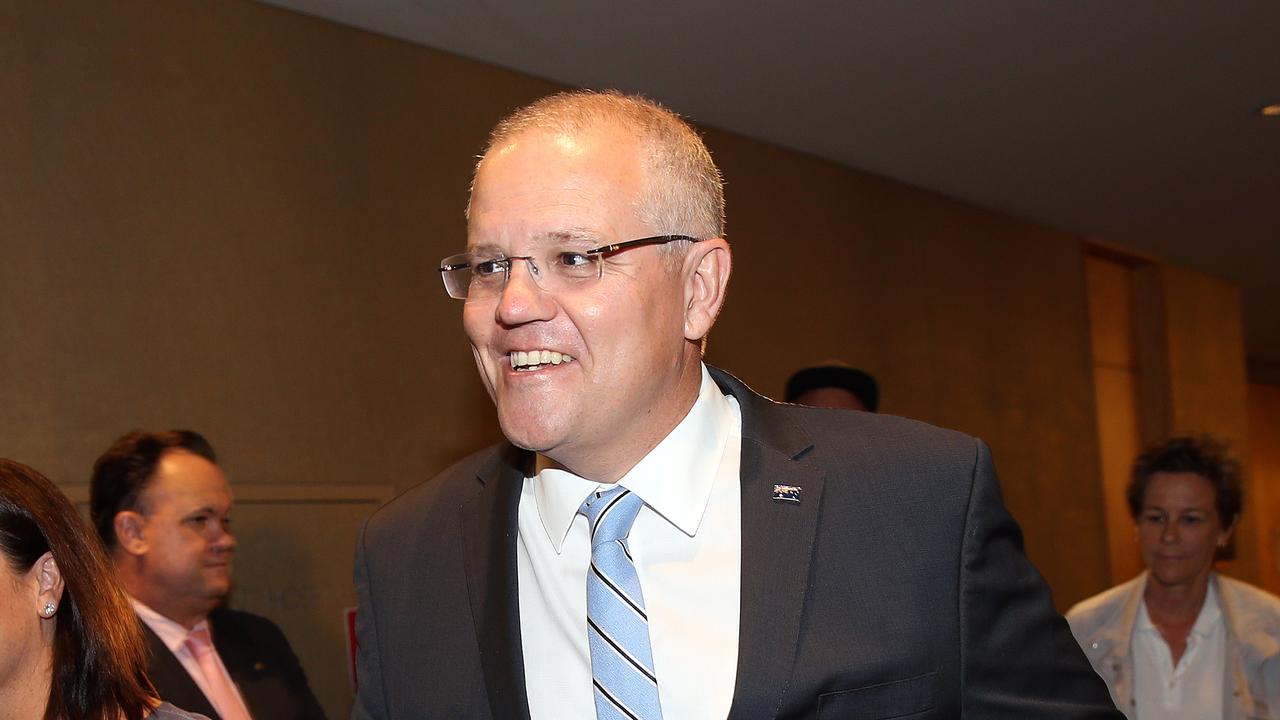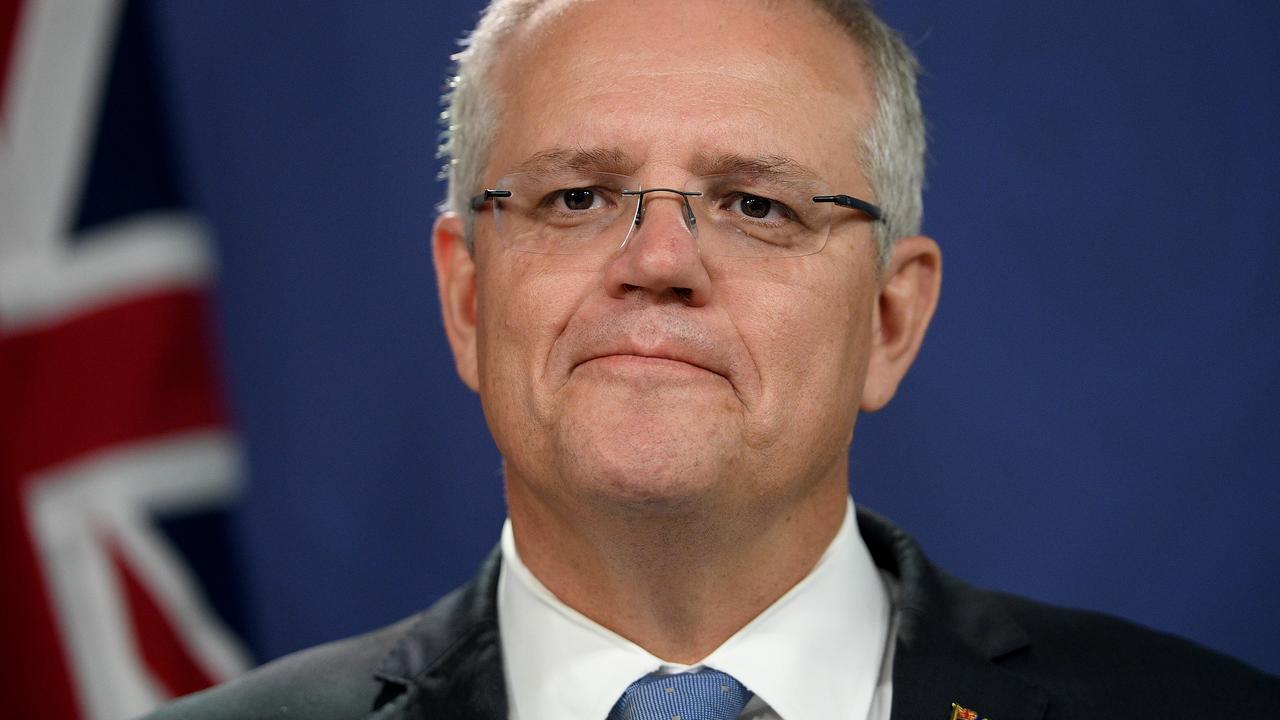Labor is getting off scot-free in the tax debate but Scott Morrison and Malcolm Turnbull are paying a heavy price. Bill Shorten has improved his media presentation, his political messages are clearer and he is taking full advantage of having released tax policies.
It is also clear that as Labor’s Treasury spokesman Chris Bowen has grown more agile and innovative, he has come up with more big ideas and been able to cut through more effectively than the Treasurer and the Prime Minister.
Bowen didn’t miss a beat in declaring Turnbull’s proposal on Wednesday to give income tax powers to the states “double taxation”, laying the groundwork for a highly effective and credible scare campaign all the way through to the election, whether it’s on July 2 or months later.
Once Turnbull confirmed reports in The Australian that he was considering giving the states income tax powers, Bowen labelled it “a plan for double taxation via state income tax surcharges”, reviving the killer political line used by NSW Labor premier Neville Wran in 1978 against Malcolm Fraser’s similar proposal when Bowen was just five years old.
“Malcolm Turnbull’s latest ‘ideas boom’ on tax takes us back to Tony Abbott’s 2014 Commission of Audit and then to the pre-1942 tax system,” he declared.
What’s more, Bowen and the Opposition Leader were able to highlight yet more apparent differences between Turnbull and Morrison by standing shoulder to shoulder and decrying the “chaos and dysfunction” at the top of the Coalition.
Labor’s response to the income tax sharing proposal — Turnbull’s hurried exposition of the biggest idea on federation for generations at a western Sydney suburban football field without any detail and the subsequent confusion — was co-ordinated, coherent and united.
Further, as more ideas emerged about health funding for the states and the proposal for the commonwealth to surrender public school funding entirely to the states, Labor frontbenchers doubled down on double taxation and raised all the latent fears about the Coalition not funding hospitals and caring only about private schools.
The states’ rejection of the income tax sharing proposal three days after it was raised will not remove it as a campaign weapon for Labor, even after Turnbull declared it “gone and finished”, because there was so much commitment to the idea within the cabinet.
Turnbull will be haunted politically by his attempt to bring about “generations” of change to federation after having embraced it so enthusiastically.
The political emphasis also will shift to the impact on families of health and education funding cuts the states are sheeting home to Turnbull as the standard bearer for Abbott’s horror 2014 budget. Polling has shown that under Shorten, Labor has lost its traditional advantage over the Coalition in core areas such as education, health and welfare, but this week’s jousting with the premiers and proposals for “big ideas” have opened the way for the ALP to regain lost ground.
Labor’s message was that Turnbull was going into an election campaign advocating higher taxes for states and that the proposals were “worse than Abbott’s”, a throwback to the 1940s, unfair and more complex.
Shorten, Bowen, Anthony Albanese and Penny Wong used identical language and claims of Coalition bias: “a more radical plan than Tony Abbott’s radical 2014 budget”; “a plan to take Australia back to the pre-1942 tax arrangements, to take Australia back to the pre-1960s school funding model”; “a plan to take Australia back to a divided economy, a divided education system, a divisive policy”; and “with his plans for double taxation for Australians, you will pay more and get less under a Turnbull government”.
As the image of tensions between Turnbull and Morrison was sharpened, Bowen and Shorten held three press conferences in a row standing next to each other and promising a Labor team that would work together.
“An incoming Shorten Labor government will have a treasurer and a prime minister working together in the best interests of Australia,” Bowen said yesterday as he welcomed Shorten to his western Sydney electorate of McMahon.
Labor was able to exploit all this as a result of government failures in the execution of ideas and exposition of arguments, as well as apparent differences between ministers and a surge in “big ideas” that took the public by surprise.
Before this week Labor had ensured it was in a more credible position to exploit such political opportunity by filling the vacuum — left by Turnbull’s retreat on raising the GST and changing negative gearing — by taking a huge risk and pre-emptively releasing its proposal on negative gearing and capital gains tax.
After Bowen developed the tax policy Shorten took the initiative — and risk — in launching a plan that has proved to be impossible for Labor in the past and was credited with losing it an election. That Labor had taken a tough decision on a challenging issue earned it credit with voters, while the government still stands mute.
A senior Labor figure tells The Weekend Australian internal polling shows 47 per cent support for Labor’s negative gearing and capital gains tax package. While that is surprisingly high, the real conclusion from that figure is that voters support Labor’s plan largely on the basis that there is a plan.
There has not been sufficient debate on Labor’s proposal for a fully informed public decision, yet this level of approval suggests the plan is being taken on faith in the absence of an alternative.
This is where the government is failing in a campaign sense: the opposition is filling a vacuum on policy, gaining public support and proving more politically adept during what is in effect an election campaign.
Essentially, Turnbull and his cabinet, while working for months on various issues such as changing federation funding to give states the ability to raise income taxes, have disappointed voters by retreating from ideas (raising the GST) or failing to deliver (state income taxes).
The failure is not an issue of consultation or listening, it is a failure to deliver combined with a propensity to create or expose political weaknesses that keep giving Labor advantages.
The Coalition has created the circumstances for Shorten to head off dangerous talk about his leadership, given Bowen economic credibility, damaged Morrison’s standing as an influential Treasurer and Turnbull’s as a positive Prime Minister, and left Labor’s contentious negative gearing policy untouched.
Part of the Coalition’s problem stems from the transactional costs of a leadership change but a large part is that the promised methodical preparation of policies is resulting too often in abandonment of an idea or failure to implement or address what have been identified as vital issues: the weight of income tax on workers, bracket creep, raising the GST, giving the states income tax powers, dropping public school responsibility or changing negative gearing.
As these ideas have been raised and publicly debated, they have added to confusion about the government’s priorities and competence while diverting energy and focus from the obvious negative attacks the Coalition should be prosecuting against Labor.
While the revival of the building industry watchdog to combat union corruption and coercion on building sites is the main reason for recalling parliament early — and the likely basis for a double-dissolution election — the approach towards linking Labor and Shorten to the union albatross has been haphazard and intermittent.
Turnbull’s intervention to attack Labor’s negative-gearing policy began with a thunderclap warning of a wrecking ball through the housing markets of Sydney and Melbourne, but became muted and muffled given the Coalition’s own policy confusion on the issue.
Turnbull is convinced the recall of parliament, the release of the budget and tax policy, and the formal calling of an election will put the government back in the driving seat and on the path to victory.
But the Coalition cannot expect to regain the momentum if it continues to let Labor off scot-free. After all, oppositions don’t win elections; governments lose them.




To join the conversation, please log in. Don't have an account? Register
Join the conversation, you are commenting as Logout